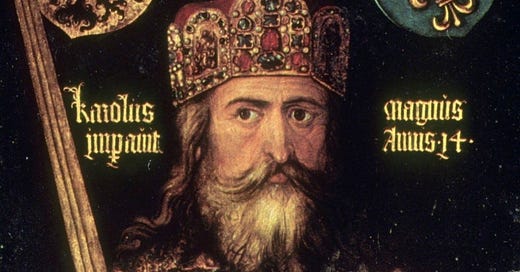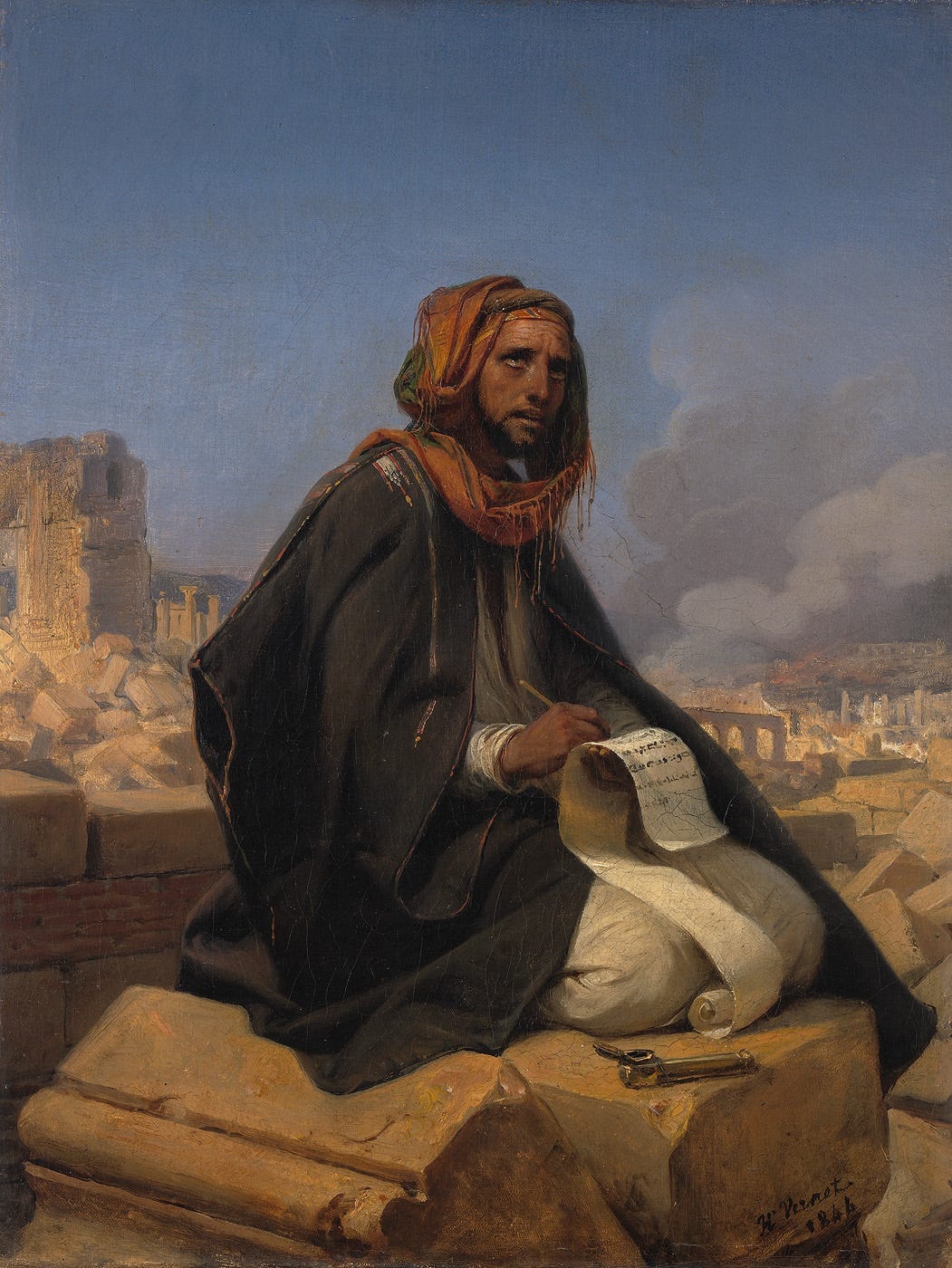Of Villains & Franks — How the Gospel Dismantles Arrogance
English, Frankish Arrogance, and Father John Romanides
The more I study ancient languages, the more I become aware of the functionality of my own mother tongue. It’s difficult to analyze because it has always been with me and something I have taken for granted. But it is interesting how the same patterns can show up in English that appear in other languages. In fact, English is particularly interesting because of its eclectic composition. Despite being a Germanic language, it is riddled with influence from Latin and French, with several cognates deriving from Greek. The contribution of French is readily apparent in the rapid transformation the language went through between the stages of Old English and Middle English. Here is the comparison, using the Lord’s Prayer as a reference:
Old English (c. 10th century)
Fæder ūre þū þe eart on heofonum,
Sī þīn nama gehālgod.
Tōbecume þīn rīce,
gewurþe þīn willa, on eorðan swā swā on heofonum.
Ūrne gedæghwāmlīcan hlāf syle ūs tōdæg,
and forgyf ūs ūre gyltas,
swā swā wē forgyfað ūrum gyltendum.
And ne gelǣd þū ūs on costnunge,
ac ālȳs ūs of yfele.
Sōþlīce.Middle English — Wycliffe Bible (1389)
Oure fadir that art in heuenes,
halwid be thi name;
Thi kyngdom come to;
be thi wille don,
as in heuen and in erthe.
Yyue to vs this dai oure breed ouer othir substaunce;
and foryyue to vs oure dettis,
as we foryyuen to oure dettouris;
and lede vs not in to temptacioun,
but delyuere vs fro yuel.
Amen.
I bring this example up because English has inherited several words in its eclectic history that illustrate how entrenched our rejection of the Gospel is. I was reminded of this from a highly polemical round table discussion on YouTube of three Orthodox Christians, two laymen and a priest (now Bishop Christodoulos), concerning the thesis of the late Fr. John Romanides concerning the so-called East-West schism.
Fr. Romanides does not place the split, as is commonly thought, between a Latin West and a Greek East, but between an “authentic” Roman hegemony on the one hand and Frankish domination on the other hand. Throughout the video, the panelists routinely describe the Eastern Orthodox Church as being the “authentic” remnant of the Roman Empire, and consider the Roman Catholic Church as a misnomer, and an organization that had been dominated and shaped by oppressive Frankish overlords who sapped the Western church of its (perceived) therapeutic soteriology, and replaced it with “legalism” to keep its conquered Roman subjects in line. The “Roman” label of the Roman Catholic Church is to be seen, in this context, in the same vein as the infamous “Holy Roman Empire”, which was unambiguously named as such primarily as a challenge to the “New Rome” of Asia, commonly known today as the “Byzantines”. In this model, the Romans were a “civilized people” who patroned the spread of Christianity, in contrast to the Franks, who were barbarians who enslaved the Romans of the West.
There’s quite a bit to chew on there, and it is a thesis wrought with issues, namely a case of the pot calling the kettle black. The panelists, at one point, accuse the Franks of being “racists”, which they connect with the racism and arrogance of Western Europe. There is merit to this (in that the attitudes are certainly connected), but the insinuation here is that the “Romans” were of a moral superiority that Western Europe eventually fell away from. Their romanticization of “lost Roman-hood” is the issue.
Their example of the Frankish arrogance against their Latin subjects is the function of the word “frank” in English, describing someone who is “honest” or “straight forward”. Indeed, this word was derived from the name of the “Franks” who enjoyed a “freeman” status in the Carolingian dynasty. Another related word is “franchise,” which refers to ownership of several enterprises. It is a dominating word in English. By contrast, many of the Franks were involved in a slave trade connected to Eastern Europe, wherein the endonym “Slav” became synonymous with servitude. The word “villain” is etymologically connected with the Roman villa (or village) where non-Franks, and thus commoners, were situated. The rustic outsider has typically been viewed with suspicion by the ruling elites. Take the example of how shepherds were viewed by the Egyptians in the book of Genesis (46:34), or even the Latin word paganus which originally referred to non-urbanites. The Romans (including their Greek counterparts) were just as bad in this regard, even after they became “Christian”. In fact, with all of the attention placed on Orthodox Christianity, it is amazing that these men don’t see the irony in the original Greek version of the Troparion of the Cross celebrated on two separate occasions on the Byzantine liturgical calendar.
Σῶσον, Κύριε, τὸν λαόν σου καὶ εὐλόγησον τὴν κληρονομίαν σου, νίκας τοῖς βασιλεῦσι κατὰ βαρβάρων δωρούμενος, καὶ τὸ σὸν φυλάττων διὰ τοῦ Σταυροῦ σου πολίτευμα
Save, o Lord, your people and bless your inheritance, gifting victory to your Kingdom against the Barbarians, and through the cross, preserving your commonwealth.
Most translations into English render βαρβάρων into “enemies,” but it is clearly referring to the “barbarian” Persians who stole the “true cross” from Jerusalem, only to lose it back to the Byzantines when Heraclius defeated the Sassanid army and paraded the cross back to the Church of the Holy Sepulcher. Americans in the 21st century would certainly scratch their heads at the use of “barbarian” here, but to a Roman (or Greek), it makes sense. The panel’s self-conception as civilized Romans against the “barbarians” mirrors the same civilizational superiority complex they are criticizing about the West. The Troparion’s use of βαρβάρων is a prime example of this, carrying with it the Greco-Roman tradition of seeing outsiders as uncivilized, even as the empire itself was no stranger to tribal elitism.
Polemics Should Go Both Ways
The challenge for any of us who claim to be under scripture’s authority is to channel the same spirit of the prophets’ inherent self-critique in their own polemics against their oppressors. The Bible reflects the trauma suffered by an erudite scribal culture that lost everything to arrogant and puffed-up outsiders who felt no shame in holding their subjects captive and “exiled” in their own land. They realized, in this scoldering humiliation, that there was no conventional way out of this reality. They were stuck in a vicious cycle. Even if their oppressors were overthrown by a more benevolent force, all human patrons come to an end — whether good or evil. For that reason, they could no longer put their trust in princes nor sons of men. They couldn’t even trust their cultural deities, or their priesthood, or even the city walls whose sole function was to protect the polis from an outside attack.
And yet, amid this chaos, the Bedouin shepherds of the Syro-Arabian desert continued on as if nothing happened. They were untouched, strangely enough, even though they had no city walls nor kings nor the pantheon who existed in the city’s various temples. Who protected the shepherds? It must have been an unseen god of the desert who needed to be all-powerful in order to keep all of the chaotic forces of the open wilderness at bay. That was the aha moment. Human pride and arrogance had sparked the ire of the desert god, who rejoices not in the things men build, but in their hospitality to the neighbor (evocative of Bedouin hospitality).
The scriptural authors knew that their oppressors were not more evil than they were — in fact, they were just as problematic. The problem was a sickness, a human sin that was as old as the ages. The authors just had to communicate to those same oppressors that no tribe has any leverage against another tribe before God. The entirety of the Heavens and Earth answers to His authority. By disassembling their own cultural myths(highlighting their flaws and sins), the Israelites present themselves as a microcosm of the larger human condition, where no nation (not even Israel) is exempt from divine scrutiny and the consequences of moral failure.
That is where we should target polemics. We shouldn’t criticize our enemies without first criticizing ourselves. Scripture is always on the side of the poor and the oppressed. That means that God prefers the “villains” and the “pagans” of this world over the “Franks” and the “Romans”. In fact, Jesus Christ is representative of both God on the one hand and the overlooked and undesirable outsider on the other hand.
ἀλλὰ τὰ μωρὰ τοῦ κόσμου ἐξελέξατο ὁ Θεὸς, ἵνα τοὺς σοφούς καταισχύνῃ, καὶ τὰ ἀσθενῆ τοῦ κόσμου ἐξελέξατο ὁ Θεὸς, ἵνα καταισχύνῃ τὰ ἰσχυρά, καὶ τὰ ἀγενῆ τοῦ κόσμου καὶ τὰ ἐξουθενημένα ἐξελέξατο ὁ Θεός, καὶ τὰ μὴ ὄντα, ἵνα τὰ ὄντα καταργήσῃ, ὅπως μὴ καυχήσηται πᾶσα σὰρξ ἐνώπιον τοῦ Θεοῦ. ἐξ αὐτοῦ δὲ ὑμεῖς ἐστε ἐν Χριστῷ Ἰησοῦ, ὃς ἐγενήθη ἡμῖν σοφία ἀπὸ Θεοῦ, δικαιοσύνη τε καὶ ἁγιασμὸς καὶ ἀπολύτρωσις
But God chose the foolish things of the world, so that he might shame the wise. And God chose the weak of the world, so that he might shame the strong. And God chose those of ignoble birth and the despised, and for those who are nothing, he nullified those who are something so that no flesh could boast before him. But by him, you are in Christ Jesus, he who became for us wisdom from God; and righteousness, and sanctification, and redemption. — 1 Cor. 1:27–30
Christ is the villain we despise. He is the outcast and the rustic, illiterate villager we’d rather not associate with. He’s the uncivilized Barbarian crucified by the Romans. He’s the Roman villager oppressed by the Frankish (free) king. He’s the heretic persecuted by the Byzantine church in the seventh century. He’s the Palestinian. He’s the Yemeni. He’s the Israeli citizen. He’s the rural, uneducated American. He’s the inner-city kid caught in urban gang violence. He’s the homeless, the mentally ill, the prisoner incarcerated for life. He’s the evil that humans do to each other put on display for all to behold his shame. He’s the image of what human arrogance does to the needy neighbor, transfigured into God’s glory. God’s glory will never be in what men build. Unless the house be built by the Lord, the building is in vain (Ps. 127)! No, it is not a human achievement. Human “achievement” crucified God’s locum tenens! It is rather God’s supreme arrogance over the worst of humanity. Only He can take something as horrific as crucifixion and turn it into something beautiful, that is, His making the locum tenens stand, causing all of the kings of the world to stumble and fall. Remember Psalm 110:
לְדָוִ֗ד מִ֫זְמֹ֥ור נְאֻ֤ם יְהוָ֨ה ׀ לַֽאדֹנִ֗י שֵׁ֥ב לִֽימִינִ֑י עַד־אָשִׁ֥ית אֹ֝יְבֶ֗יךָ הֲדֹ֣ם לְרַגְלֶֽיךָ׃
Mizmor of David: Yahweh says to my Lord, sit to my right hand until I set your enemies as your footstool. — Ps. 110:1
The enemies in question are the human leaders. They are the Donald Trumps, the Benjamin Netanyahus, the Volodomyr Zelenskyys, and Vladimir Putins. The example of Benjamin is interesting because his name in Hebrew literally means “son of the right hand”. Netanyahu, the politician, is a false messiah. The country “Yemen”, which Trump is obliterating on Netanyahu’s behalf, comes from the Semitic root y-m-n meaning “right” as in the Hebrew “right hand”, יָמִין yamin. The beauty of the Semitic tongue is that God’s judgment is clear and present before all the world, if only the elite could have ears to hear. God loves those at His right hand. Netanyahu means “Yahweh gave”. The scriptural God has complete providence, even over the powerful elite. Netanyahu has nothing that God has not provided for him. That is bad news because he will have to give an account. An appeal to his name will not help him. Netanyahu is nothing; God is everything.
So we cannot boast in a romanticized past. It never existed. Rome was never “Christian” in the “Acts of the Apostles” kind of way. Byzantium is nothing to boast about, and no Orthodox Christian should be proud of any “Roman heritage”. We should only boast in the Lord who cancels us out. We are no longer in the equation. An Orthodox Christian cannot be if he wants to give glory to the God who is. There is only one God, and it isn’t you.
Pray for Gaza, the West Bank, Syria, Yemen, and all who suffer at the hands of the arrogant human being. Glory alone to God in the Highest, now and forever, and unto the ages of ages. Amen.






